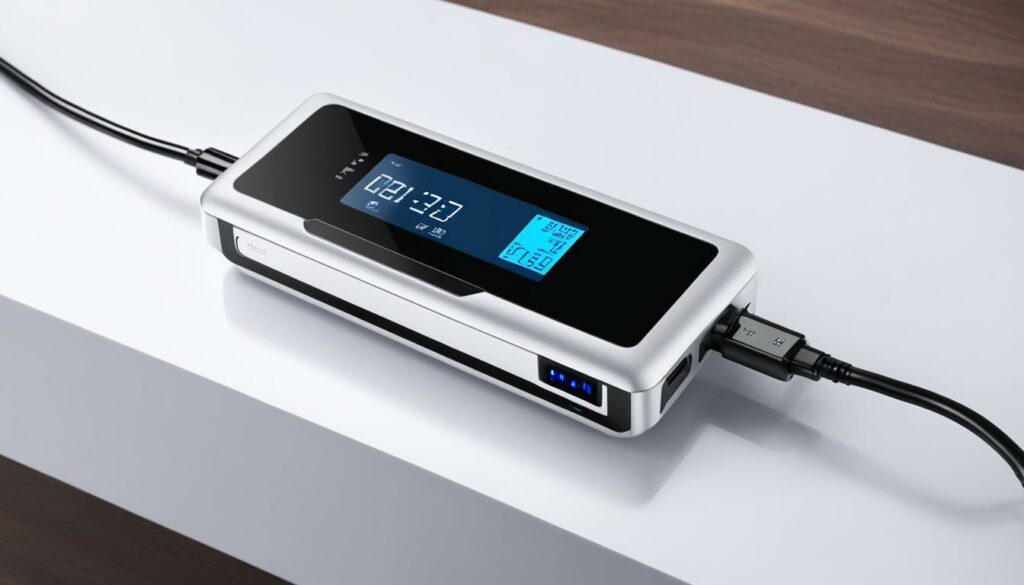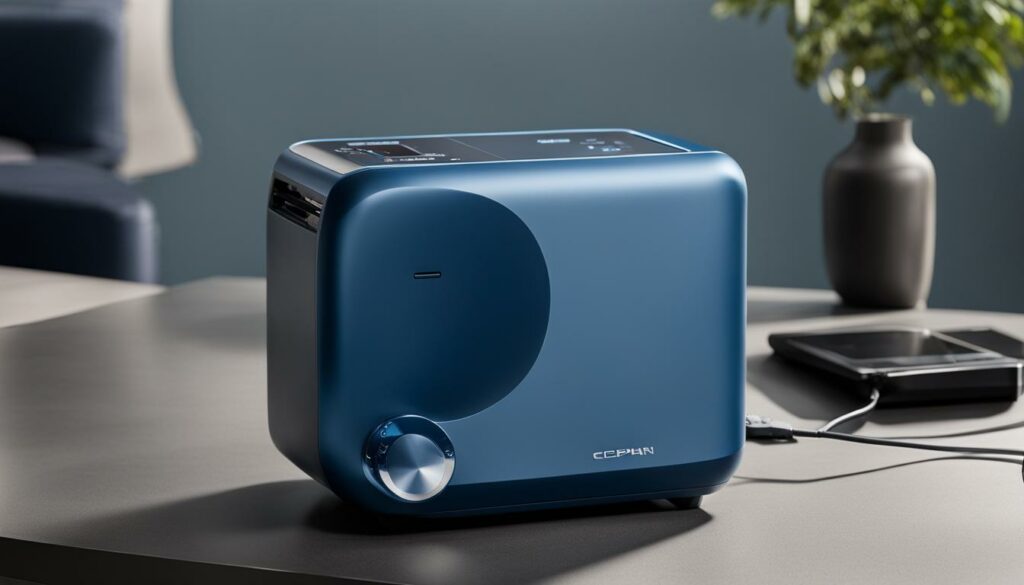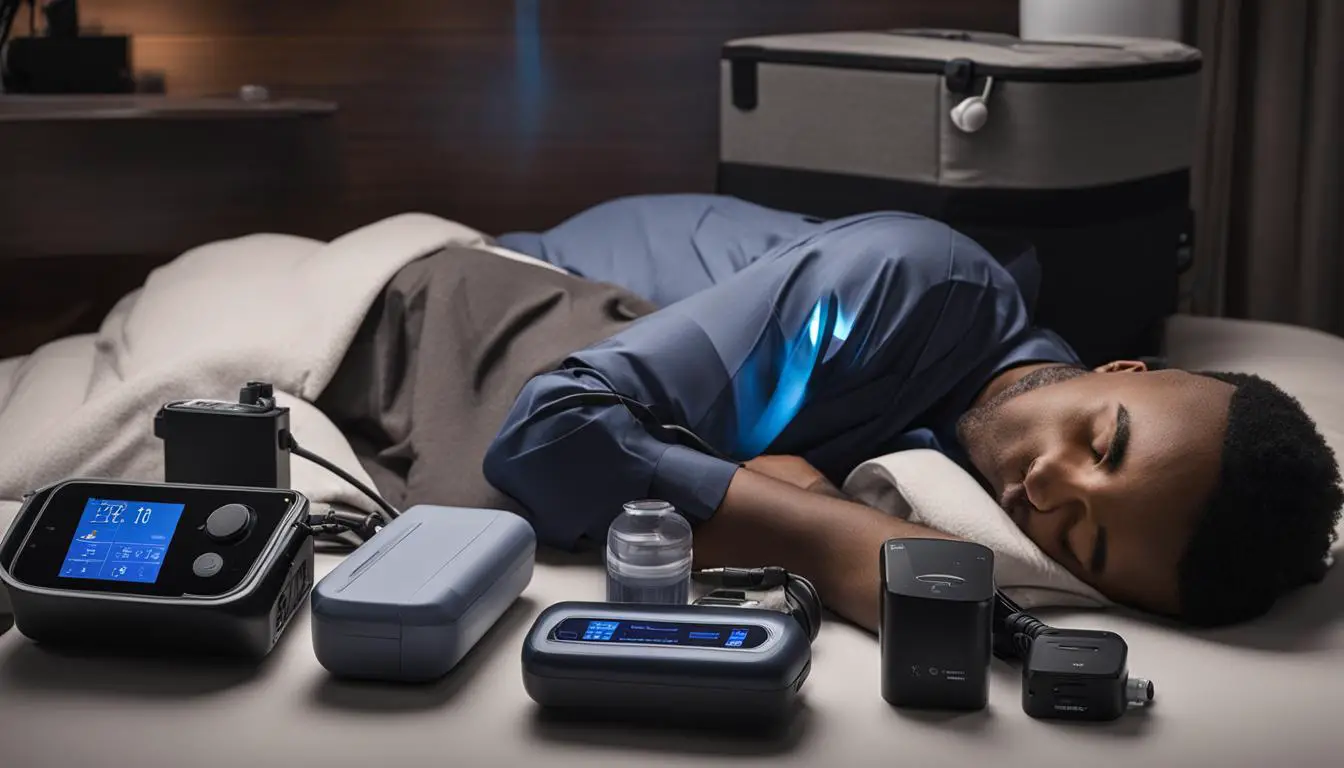Top CPAP Power Stations – Find Your Best Match!
Originally posted on January 4, 2024 @ 2:40 pm
Are you in need of the top-performing power station for your CPAP machine? It is vital to have a reliable source of emergency power for your CPAP, especially if you rely on consistent airflow while sleeping. Disruptive situations such as power outages should not jeopardize your well-being, which is why trustworthy solutions for CPAP power are crucial. With numerous options available, selecting the ideal power station may seem daunting. But, worry not! We are here to assist you in finding the ideal fit for your CPAP requirements, ensuring uninterrupted therapy and peace of mind.
Portable power stations have become game-changers for those requiring a constant energy source for their CPAP machines. They are not just a backup during blackouts but also your best travel partners ensuring you’re never without CPAP therapy, no matter where you are. With features that include sizable battery capacities for longer use, multiple charging methods, and portability, these power stations offer flexibility while providing the security that your health demands.
Key Takeaways
- Discover the essential qualities of effective CPAP power stations.
- Learn why a CPAP battery backup is a crucial investment for uninterrupted sleep therapy.
- Gain insights into the top features that make a power station suitable for your CPAP device.
- Understand the significance of having a portable power solution for travel and emergencies.
- Appreciate the necessity of researching and comparing different models to find your ideal power source.
Understanding the Importance of CPAP Power Solutions
For those relying on Continuous Positive Airway Pressure (CPAP) therapy, the thought of a power outage can be a major concern. Devices specifically designed to keep your CPAP running in the absence of standard electrical power, such as CPAP power outage backups and CPAP power banks, can be life-saving accessories. These innovative solutions provide peace of mind and the assurance of uninterrupted therapy regardless of the circumstances.
What is a CPAP Machine and Why You Need a Power Station
CPAP machines are designed to provide a continuous stream of air to individuals with obstructive sleep apnea, helping them maintain regular breathing patterns during sleep. In order to ensure these critical devices operate throughout the night, a reliable CPAP power supply becomes indispensable. A portable power station for CPAP not only adds a layer of reliability during unexpected power loss but also enhances your mobility, granting you the freedom to travel and remain active without compromising your health.
Navigating Power Outages with a Reliable CPAP Battery Backup
Power outages are unpredictable and can happen for a variety of reasons, but with the right CPAP battery backup, you’ll navigate these with ease. This added layer of security means your CPAP therapy continues without interruption, allowing you a restful and safe sleep—even during a blackout. Choosing a high-capacity, rechargeable power bank tailored to your machine’s specifications is crucial for continuous therapy.
Benefits of Investing in a Quality CPAP Power Supply
Investment in a quality power supply transcends beyond keeping the lights on; it’s about safeguarding your health. Heated humidifiers and various pressure settings on CPAP machines can increase energy consumption, requiring a power station that can handle the additional load. Brands like the Jackery Explorer series offer options tailored to the unique needs of CPAP users, with the added advantage of portability and reduced noise levels for a better night’s rest.

| Jackery Model | Capacity | Noise Level | Runtime |
|---|---|---|---|
| Explorer 2000 | 2060Wh | Below 53dB | Up to 61 hours |
| Explorer 1000 Pro | 1002Wh | Below 46dB | Up to 28 hours |
| Explorer 500 | 518Wh | Below 46dB | Up to 14 hours |
Exploring Types of CPAP Machines and Their Power Needs
As you navigate through the nuances of CPAP power options, it’s essential to recognize the variety of machines available and their corresponding power consumptions. The type of CPAP machine you use will determine the best power station for CPAP use tailored to your needs. Below, you’ll find a comprehensive outline that helps outline the power requirements for different CPAP types, emphasizing the critical role of a CPAP battery backup system in ensuring uninterrupted sleep apnea therapy.

- Standard CPAP Machines: Typically require between 30 to 60 watts, making a reliable power station a necessity, especially during travel or power outages.
- Travel CPAP Machines: Designed for portability and efficiency, consuming between 5 to 20 watts. They’re compact and significantly lighter than their standard counterparts.
- CPAPs with Heated Humidifiers: The addition of a heated humidifier can elevate the power needs to about 100 watts, accounting for the increased energy demands of maintaining moisture.
With these power requirements in mind, it’s paramount to choose a power station that aligns with your CPAP model’s energy consumption. The Jackery Explorer series is lauded for its diversity in accommodating varying capacities suitable for different types of CPAP users.
| Jackery Model | Capacity | Runtime (Hours) | Noise Level (dB) |
|---|---|---|---|
| Explorer 2000 Pro | High | 30 to 61 | |
| Explorer 1000 Pro | Medium | 14 to 28 | |
| Explorer 500 | Basic | 7 to 14 |
Remember: The Jackery Explorer 2000 Pro is ideal for heavy power use, such as needing 30 to 61 hours for a standard CPAP machine with a humidifier, while the 1000 Pro and 500 models suit more moderate usage, delivering power efficiently and quietly, ensuring that your sleep therapy proceeds unhindered.
How to Calculate Your CPAP’s Power Consumption and Battery Requirements
Understanding the power dynamics of your CPAP device is the key to ensuring uninterrupted sleep therapy. It involves knowing the daily energy consumption, calculating the expected battery runtime, and considering additional energy usage to be fully prepared.
Determine Your Daily Energy Consumption
To begin, assess the overall energy use of your CPAP machine on a daily basis. Account for its base power requirement and additional consumption by ancillary items like humidifiers or heated tubes. This is your starting point for selecting the best battery backup for CPAP.
Calculating Runtime Based on Battery Capacity
After you’ve assessed your CPAP’s wattage, compare it with the watt-hour (Wh) rating of a potential battery. Divide the device’s power consumption in watts by the battery’s capacity in watt-hours to determine how long it will power your CPAP. Selecting a high-quality CPAP travel battery plays a significant role in ensuring you don’t wake up to a power outage.
Adding a Safety Margin to Your CPAP Battery Pack
It’s crucial to include a safety margin in your estimates to account for the unexpected. This considers energy efficiency loss and unforeseen consumption spikes. With robust CPAP power supply options like Jackery Explorer Portable Power Stations, you can rest easy knowing that your device will remain powered through the night and beyond.
Selecting the best battery backup for CPAP is not just about meeting your current needs but also preparing for unforeseen circumstances. With this comprehensive approach, you are more than ready to power through the night with confidence, no matter where your travels take you.
Comparing Features of Top-Rated CPAP Power Banks
When it comes to selecting the best power station for CPAP machines, you’ll want to focus on a few key characteristics to ensure you’re making the right choice. Battery type stands out as a primary concern—whether you opt for the robust Lithium-ion batteries seen in the Jackery Explorer Power Stations or the long-lasting Lithium-Iron-Phosphate (LiFePO4) batteries, which are praised for their durability and safety. Significant too is the power output type, as many CPAP machines require Pure Sine Wave output to function correctly without risking damage to sensitive electronics.
Top contenders like the Medistrom Pilot-24 have set the bar high. Not only are these CPAP power banks FAA compliant, which is perfect for your travel needs, but they also come with convenient USB ports for charging multiple gadgets simultaneously and act as a UPS during power outages. The value of compatibility cannot be overstated—you must ensure that the power bank you’re considering is suited to your CPAP model. After all, a power bank that doesn’t interface with your machine is like a cell phone without a signal—frustrating and useless in your time of need.
In the same vein, well-acclaimed series like Zopec’s Explore and the Portable Outlet Uninterruptible Power Supply have gained popularity for their near-universal adaptability. They boast features such as automatic switching technology, which ensures your CPAP therapy continues seamlessly through power interruptions. By carefully comparing these CPAP power solutions side by side, you can identify a CPAP power station or CPAP power bank that aligns with your lifestyle and meets your needs, ensuring your sleep therapy proceeds undisturbed.
FAQ
What is a CPAP machine and why do I need a power station?
A CPAP machine is a medical device that provides continuous positive airway pressure to individuals with sleep apnea. You need a power station to ensure that your CPAP machine can continue to operate during power outages, while traveling, or in any situation where access to a power outlet is limited or unreliable. A power station provides a reliable CPAP power solution to maintain your therapy uninterrupted.
How do power outages affect CPAP users, and how can a CPAP battery backup help?
Power outages can disrupt CPAP therapy, potentially causing health risks for those dependent on the machine for a good night’s sleep. A CPAP battery backup provides an emergency power supply to keep the CPAP machine operational during outages, ensuring continuous treatment and peace of mind for users.
What are the benefits of investing in a high-quality CPAP power supply?
Investing in a high-quality CPAP power supply ensures that your CPAP therapy is not disrupted by power issues. It offers portability, convenience, and the flexibility to use your CPAP machine in various settings, including outdoor adventures or travel. Good power supplies are also durable, efficient, and provide multiple charging options like solar power.
How can I identify the best power station for my CPAP machine?
The best power station for your CPAP will depend on your machine’s power needs, which vary based on machine type, pressure settings, and additional features like humidifiers. Look for a power station with the appropriate watt-hour capacity, a pure sine wave output for sensitive electronics, and compatibility with your specific CPAP model.
What types of CPAP machines are there and how do their power needs differ?
CPAP machines come in various types including Standard CPAP, APAP, BiPAP, and Travel CPAP. Each type has different power requirements, with Standard CPAPs consuming between 30 to 60 watts, and Travel CPAPs needing 5 to 20 watts. If you use a heated humidifier, this will also increase the power consumption. Selecting a power station with sufficient battery capacity to cover your machine’s needs is important.
How do I determine my daily energy consumption for CPAP?
To determine your daily energy consumption for CPAP, start by identifying the power consumption (in watts) of your CPAP machine, which is typically listed on the machine or in the user manual. Add any extra power for features like humidifiers. Then, multiply the total wattage by the number of hours you use your CPAP machine each night to find your daily energy usage.
What is the method for calculating runtime based on battery capacity?
To calculate runtime, divide the battery capacity of the power station (in watt-hours) by your CPAP machine’s power consumption (in watts). This will give you an estimated runtime in hours. Remember that this is a theoretical value and real-world conditions may result in slightly different runtimes.
Why should I add a safety margin to my CPAP battery pack calculation?
Adding a safety margin to your calculation accounts for any unforeseen power consumption that may occur due to additional features being used, variances in power draw, or energy losses during conversion. This ensures that your CPAP machine has more than enough power to last through the night, even if usage is higher than expected.
What features should I look for when comparing CPAP power banks?
When comparing CPAP power banks, consider the battery type (lithium-ion vs. LiFePO4), battery capacity, portability, and whether the power output is a Pure Sine Wave, which is better for sensitive electronic devices. Also check for compatibility with your CPAP model, safety certifications, noise level, and additional ports for charging other devices. Reading reviews and comparing specs can help you find the power bank that best fits your needs.








